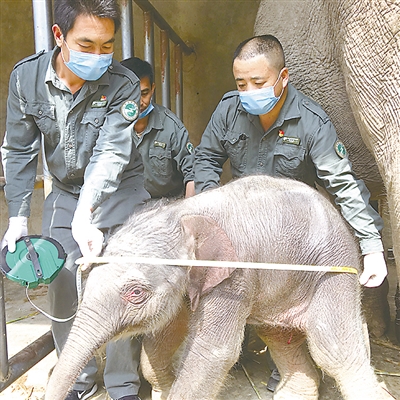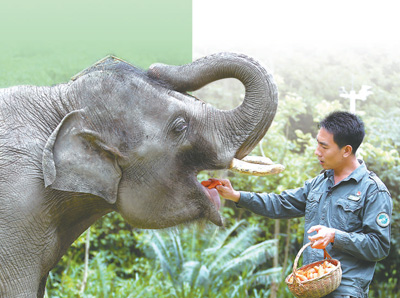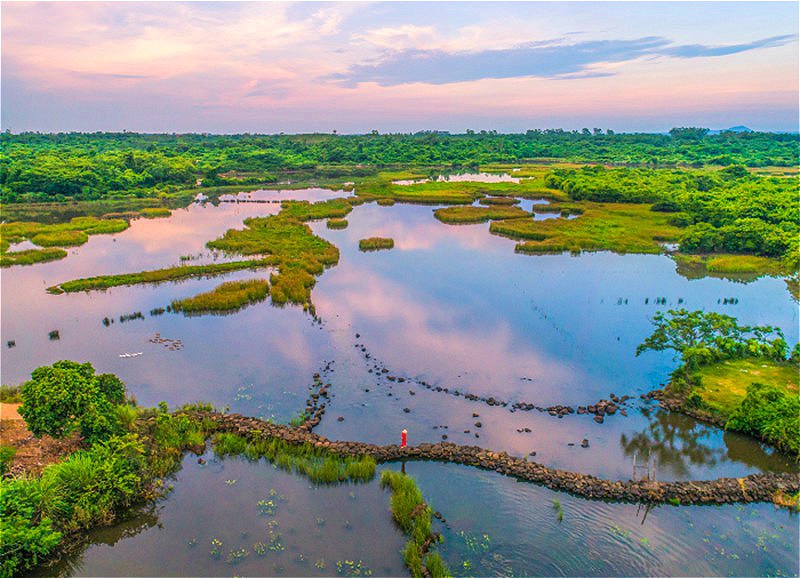Yunnan animal center works to save Asian elephants, expand their population
Located in dense and lush tropical forests in Xishuangbanna, southwest China’s Yunnan province, the Asian Elephant Breeding and Rescue Center is dedicated to giving careful and effective protection to wild elephants.
Though the jungles provide rich sources of food and water for the elephants, they can also pose a threat to them if they become ill or injured, making it difficult for them to survive in the wild.

Veterinarians conduct a physical examination of a baby elephant at the Asian Elephant Breeding and Rescue Center in southwest China’s Yunnan province. Photo courtesy of the Wild Elephant Valley in southwest China’s Yunnan province
In August 2015, a baby elephant that was less than one month old was abandoned by her herd at the doorway of a farmer’s house in Simiao, Pu’er city. Veterinarians from the Asian Elephant Breeding and Rescue Center came and took the animal to their center for treatment. She was found to have intra-abdominal infections and heart failure. She was also at risk of septicemia, or blood poisoning.
The baby elephant finally recovered after proper treatment by the keepers at the center. However, without the presence of her mother, she became malnourished due to a lack of breast milk. At that time, she weighed only 76 kilograms, much smaller than an average newborn elephant.
The vets decided to feed her goat milk, and as she was born in the Chinese Year of the Goat, the elephant was named Yang Niu (“Yang” is Chinese for goat, and Niu means girl). The elephant is now about 6 years old, 1.8 meters tall and weighs 1.3 tonnes.
Currently, there are 11 rescued Asian elephants living at the center and being cared for by 27 keepers, who spend more than 10 hours with them each day. Thanks to these efforts, the population of Asian wild elephants in the province has reached 300 from 150 over the past 30 years, maintaining steady growth.

A veterinarian conducts an examination of the oral cavity of a baby elephant. Photo courtesy of the Wild Elephant Valley in southwest China’s Yunnan province
Another important job done by the rescue center is to help the elephants adapt to living in the wild.
“Some skills can only be learnt in the wild,” said Zhou Fangyi, a staff member at the center. Every day, Zhou spends at least 6 hours training the elephants in the wild, helping them obtain skills such as looking for food, and adapting to the environment.
The center has also made great efforts to improve the success rate of breeding. Thanks to improvements made in breeding technologies, a total of nine elephants have been bred at the center since its establishment.
The local government has designated a place as a source of food for the elephants so that they do less damage to villagers’ crops while looking for food. They’ve also monitored the elephants using technologies such as drones to keep track of their activities and prevent encounters between villagers and the elephants. The local government has also purchased commercial insurance for residents to compensate them if the elephants attack them.
Photos
Related Stories
- China's migrating elephant herd lingers in southwest township
- China's migrating elephants linger by township in Yunnan
- China's migrating elephant herd heads further southwest
- Elephant herd continues to wander in major Chinese city
- 2 dead in China elephant attacks
- ‘Border residents’ roam freely between China and Laos
- Chinese tourists denounce rumor that killer elephant was enraged by tail yank
- 3 Chinese companies stop elephant entertainment programs
- 13 wild elephants scavenge for food in Yunnan village
- Villager injured in China elephant attack
Copyright © 2021 People's Daily Online. All Rights Reserved.










